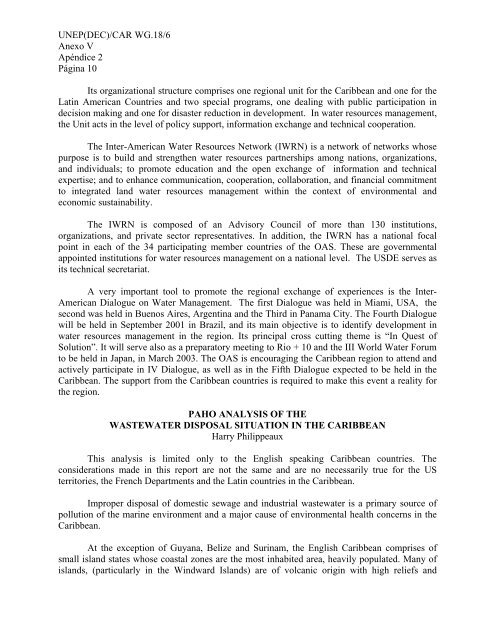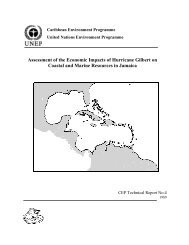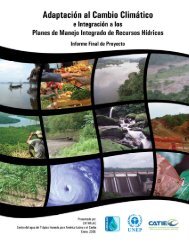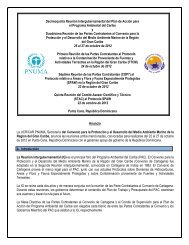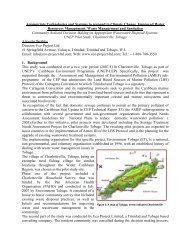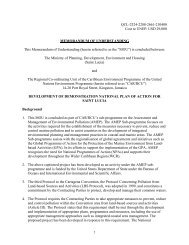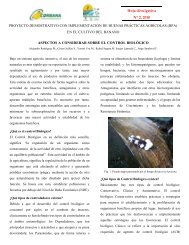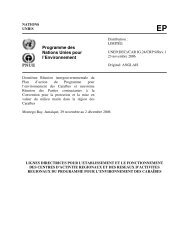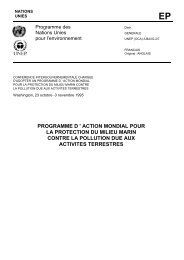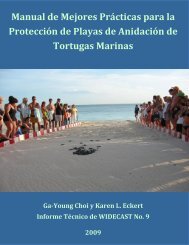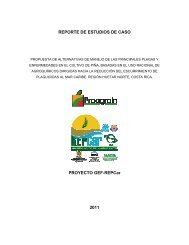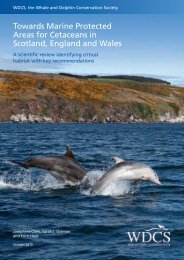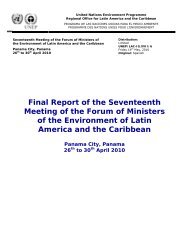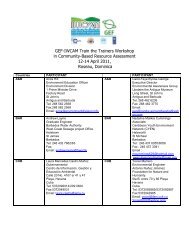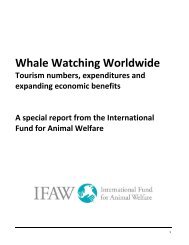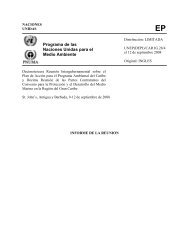Caribbean Environment Programme - UNEP
Caribbean Environment Programme - UNEP
Caribbean Environment Programme - UNEP
You also want an ePaper? Increase the reach of your titles
YUMPU automatically turns print PDFs into web optimized ePapers that Google loves.
<strong>UNEP</strong>(DEC)/CAR WG.18/6<br />
Anexo V<br />
Apéndice 2<br />
Página 10<br />
Its organizational structure comprises one regional unit for the <strong>Caribbean</strong> and one for the<br />
Latin American Countries and two special programs, one dealing with public participation in<br />
decision making and one for disaster reduction in development. In water resources management,<br />
the Unit acts in the level of policy support, information exchange and technical cooperation.<br />
The Inter-American Water Resources Network (IWRN) is a network of networks whose<br />
purpose is to build and strengthen water resources partnerships among nations, organizations,<br />
and individuals; to promote education and the open exchange of information and technical<br />
expertise; and to enhance communication, cooperation, collaboration, and financial commitment<br />
to integrated land water resources management within the context of environmental and<br />
economic sustainability.<br />
The IWRN is composed of an Advisory Council of more than 130 institutions,<br />
organizations, and private sector representatives. In addition, the IWRN has a national focal<br />
point in each of the 34 participating member countries of the OAS. These are governmental<br />
appointed institutions for water resources management on a national level. The USDE serves as<br />
its technical secretariat.<br />
A very important tool to promote the regional exchange of experiences is the Inter-<br />
American Dialogue on Water Management. The first Dialogue was held in Miami, USA, the<br />
second was held in Buenos Aires, Argentina and the Third in Panama City. The Fourth Dialogue<br />
will be held in September 2001 in Brazil, and its main objective is to identify development in<br />
water resources management in the region. Its principal cross cutting theme is “In Quest of<br />
Solution”. It will serve also as a preparatory meeting to Rio + 10 and the III World Water Forum<br />
to be held in Japan, in March 2003. The OAS is encouraging the <strong>Caribbean</strong> region to attend and<br />
actively participate in IV Dialogue, as well as in the Fifth Dialogue expected to be held in the<br />
<strong>Caribbean</strong>. The support from the <strong>Caribbean</strong> countries is required to make this event a reality for<br />
the region.<br />
PAHO ANALYSIS OF THE<br />
WASTEWATER DISPOSAL SITUATION IN THE CARIBBEAN<br />
Harry Philippeaux<br />
This analysis is limited only to the English speaking <strong>Caribbean</strong> countries. The<br />
considerations made in this report are not the same and are no necessarily true for the US<br />
territories, the French Departments and the Latin countries in the <strong>Caribbean</strong>.<br />
Improper disposal of domestic sewage and industrial wastewater is a primary source of<br />
pollution of the marine environment and a major cause of environmental health concerns in the<br />
<strong>Caribbean</strong>.<br />
At the exception of Guyana, Belize and Surinam, the English <strong>Caribbean</strong> comprises of<br />
small island states whose coastal zones are the most inhabited area, heavily populated. Many of<br />
islands, (particularly in the Windward Islands) are of volcanic origin with high reliefs and


